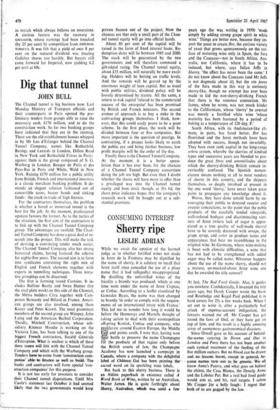Sherry ripe
CONSUMING INTEREST LESLIE ADRIAN
While we await the opinion of the learned judge as to whether fortified wines not made in Jerez de la Frontera may be dignified by the name of sherry, it is salutary to recall that Jerez itself once conceded the use of a place name that it had (allegedly) misappropriated. By distilling the unfortified wines of the locality a brandy was produced, which at one time went under the name of Jerez Cognac, or Coflac. According to a leaflet circulated by Gonzalez Byass, the name was then changed to brandy 'in order to comply with the require- ments of an international treaty with France.' This led me to wonder how long it would be before the Hennessys and Martells thought of taking action to deal with their cosmopolitan offspring Koniak, Coniac and company, who ... oliferate around Eastern Europe, the Middle t and points south. I note that, having won
ear battle to preserve the name Champagne t.31- the products of that region only before the British courts of law, the Champagne Academy has now launched a campaign in Canada, where a .company with the delightful label • of Clettenu, Gai has been- printing the-- sacred word on its sparkling wine labels.
But back to this sherry business. There is an Aldine paperback in existence called A Word Book of Wine, written by an Australian, Walter James. He is quite forthright about Sherry, Australian, whir was- until a few years ago (he was writing in 1959) 'made simply by adding strong grape spirit to white wine.' Things are better now, because they im- port the yeast to create for, the curious variety of yeast that grows spontaneously on the sur- face of maturing wine only in Spain, the Jura and the Caucasus—not in South Africa, Aus- tralia, nor California, where it has to be induced, but where, says Julian Jeffs in Sherry, 'the effect has never been the same.' I do not know about the Caucasus (and Mr Jeffs is not dogmatic about it), but the yin jaune of the Jura made in this way is curiously sherry-like, though no attempt has ever been made to kid the non-sherry-drinking French that there is the remotest connection. Mr James, when he wrote, was not much kinder to the Californians, whose 'sherry' he averred was merely a fortified white wine 'whose rnatUrity has been hastened by a period of baking at a temperature of 120 deg. F.'
South Africa, with its Andalusian-like cli- mate, in parts, has fared better, for has flourished and the Jerez methods have been adopted with success, though not invariably. They have even sunk capital in the long-range solera system, whereby the sherries of kindred types and successive years are blended to pro- duce the great Tinos and amontillados about which the sherrry-drinking British remain in- extricably confused. The Spanish nomen- clature means nothing at all to most vendors of sherry in this country, and the shippers themselves, so deeply involved at present in the one word 'sherry,' have never taken great pains to propagate any knowledge about it.
Worse, they have done untold harm by en- couraging their public to demand sweeter and sweeter concoctions, to the point that the noble products of the carefully tended vineyards, well-ordered bodegas and discriminating vint- ners of Jerez (where lack of sugar is appre- ciated as a true quality of well-made sherry) have to be severely doctored with arrope, the grape syrup, and color to produce tastes and appearances that bear no resemblance to the original wine. In Germany, where wine-making is beset with climatic difficulties, a wine that has not had to be strengthened with added sugar may be called natur. Whatever happens about the use of the name sherry, should not a mature, un-mucked-about Jerez wine one day be awarded the title natural?
At last, The Bad Food Guide. Alas, it guides you nowhere. Confidentially, I invented the title years ago, but Derek Cooper wrote the book and Routledge and Kegal Paul published it in hard covers for 25s a few weeks back. When I set out to write it, after a particularly bad attack of expense-account indigestion, the lawyers warned me off. Mr Cooper has got round the laws of libel, or they have got on top of him, and the result is a highly amusing array of anonymous gastronomical disasters.
Since Orwell gave us his account of behind- the-scenes catering in Down and Out in London and Paris there has not been another such cynical- treatment of the feeding of the five million suckers. But no blood can-be drawn
- and , no lessons lean*. except- in. general; be- cause names- turn-out to






































 Previous page
Previous page